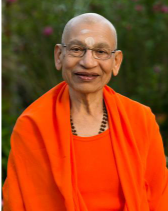
Spirituality: Most spend away lives as dictated by ‘iccha‘ and ‘dvesha‘

By Swami Viditatmananda Saraswati*
– In continuation of the last article
Yo madbhaktah, sa me priyah!
(My devotee is very dear to me!)
Lord Krishna says one among thousands gets an idea that probably what we are doing is not the way to do it. Most people spend their life and finish it off. They go from one desire to the other, thinking that if that did not work out something else will work. Life after life can go like that because that is how we are born. Lord Krishna says that all beings and particularly human beings are born with iccha and dvesha, iccha meaning “this is what I want”, dvesha meaning “this is what I don’t want”. In this way, they exhaust their lives.
To help us get the insight that maybe what we are doing is not the way to permanent happiness, the scriptures show us the path. We are born with this impulse of iccha and dvesha, I like this and I do not like this, I want this and I do not want that. Usually, those impulses dictate what I do and don’t do. I think that by satisfying those impulses, I will be happy. When there is a desire and I satisfy the desire, I feel happy. When I don’t like someone and I see that person unhappy, I feel happy.
There are two ways of becoming happy, one is iccha and the other is dvesha. When we are rooting for a team and we see that the other team is losing, we feel happy. That is called dvesha. When we feel happy because others are doing well, that is called iccha. Both give us happiness. Right from birth people have iccha and dvesha. Most people live their lives merely satisfying these impulses of desire and aversion, fulfilling their desires for what they want and avoiding and hating and hurting and retaliating to that which they hate. As more desires are fulfilled, more desires arise. The more I hate others, the more hatred arises. It doesn’t go. The hatred also keeps on increasing. Most people simply spend away their lives as dictated by their iccha and dvesha.
So, Lord Krishna says that nobody even bothers about Him, nobody wants to know Him. When he has displayed himself and nobody looks at him, can he not feel bad? People look at his costume and don’t look at him. But jnananam, punya karmanam, if because of our samskara, our upbringing, or for whatever reason, we have a value for punya karma or virtuous deeds, like a value for being hardworking or honest or truthful or sincere and dedicated, that is called punya karma. If we perform an act of virtue, an act of dharma, then dharma comes into our life, punya karma comes into our life. A virtue comes into our life that has the effect of neutralizing the influence of iccha and dvesha. We are born with these impulses, but if because of our samskaras, because of upbringing, the family and environment in which we were born, the way we were raised, the kind of values we were given, which were demonstrated by the way our parents lived, then we also adopted these values in our lives, even though living some of those values caused some hardships. Lord Krishna says that when there is punya karma, when there is dharma in life and when there is virtue in life, slowly there will be a neutralizing of the impulses of iccha and dvesha. So there is a way out. Even if we are born with iccha and dvesha, the path of dharma, righteousness, punya, also is there.
Bhakta begins with living a life of virtue. Virtue is following the order of the law which obtains in the universe, which is called the moral law. There is the law of the land, which should be followed, but there is also the moral law. Sometimes the law of the land is not sufficient because of many loopholes. Then it is possible for us to violate the law of the land and get away with it. Not everyone stops at a stop sign. You look and go, but don’t stop usually. This is human law and it is possible not to be caught sometimes. But you cannot get away from the moral law. Someone is watching, not only from the outside but there is also someone inside who is watching every thought of mine, every intention of mine. The world outside only watches what I do and accordingly, I may be treated, but there is someone who watches the intention with which I do it. Even though I can be smiling and appear different from what I really am, that is called Maya, and it can delude you.
What I am saying is that after all there is a limitation to what human law can do to us. We are often smarter than the law and we can find loopholes and get away without being punished. But where the moral law is concerned, we cannot get away because there is someone inside who is watching. Not only my actions are watched, but my intentions also are watched. That is where the change has to happen. There is punya karma where there is a God-fearing person, someone who is not afraid of God but who takes God into account. We behave differently in the presence of different people. With our friends, we behave in one way.
With children, we behave in a different way, with our parents also in a different way and so on. When there is an important person, a respectable person, a reverential person, then automatically we take that into account and behave in a certain way. Similarly, when we recognize that there is God everywhere and watching, we should take him into account. That is called God-fearing, not afraid of God, but someone who takes God into account, knowing that he is there, and behaves accordingly, reverently. That is how the punya karma comes into our life.
The iccha and dvesha are attenuated. Then the bhakti arises in the heart of the person. That is how Lord Krishna in the seventh chapter of the Bhagavad Gita describes his own self and how the bhakti can arise when there is purification in the mind. He describes how impurity can deny us the very bhakti or devotion and how purity of mind is required to discover the devotion.
(Concluded)
*Swami Viditatmananda Saraswati has been teaching Vedānta Prasthānatrayī and Prakaraṇagranthas for the last 40 years in Ahmedabad, Gujarat. Throughout the year, he conducts daily Vedānta discourses, accompanied by retreats, and Jñāna Yajñas on Vedānta in different cities in India and in foreign countries.





